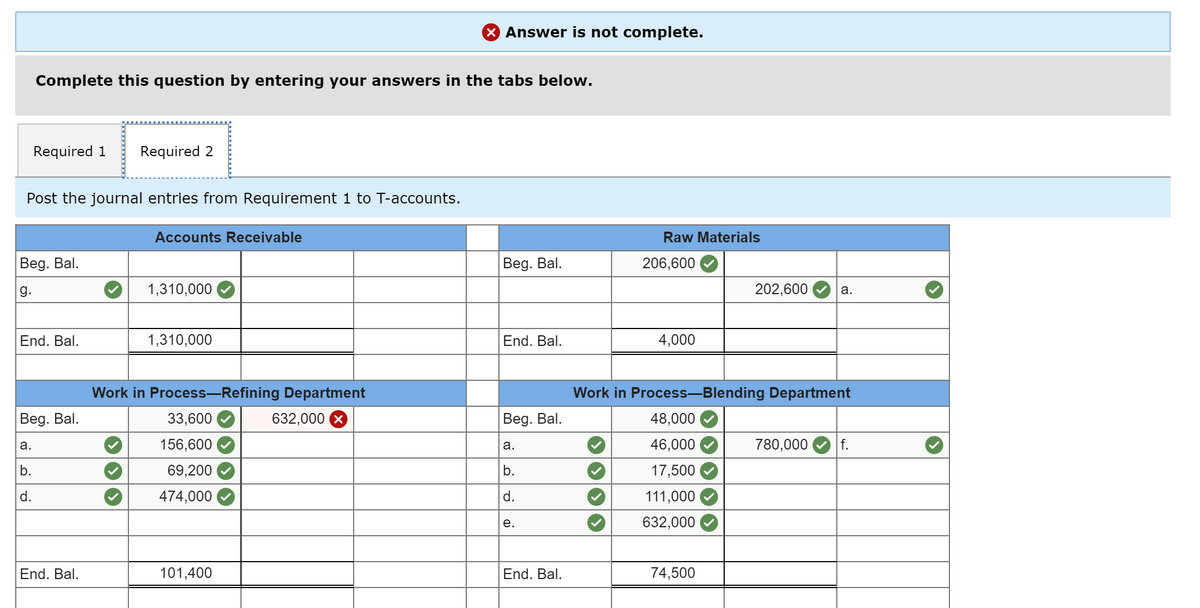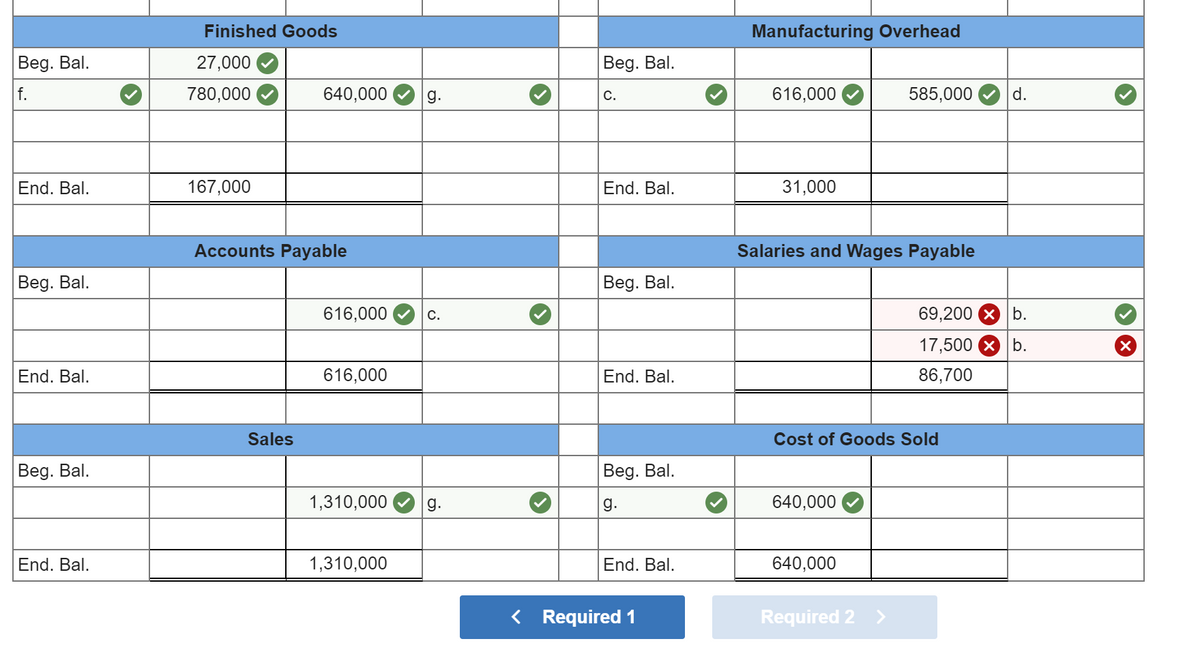Work in Process—Refining Department March 1 balance 33,600 Completed and transferred to Blending ? Materials 156,600 Direct labor 69,200 Overhead 474,000 March 31 balance ? The March 1 work in process inventory in the Refining Department consists of the following elements: materials, $8,700; direct labor, $4,000; and overhead, $20,900. Costs incurred during March in the Blending Department were: materials used, $46,000; direct labor, $17,500; and overhead cost applied to production, $111,000. Required: 1. Prepare journal entries to record the costs incurred in both the Refining Department and Blending Department during March. Key your entries to the items (a) through (g) below. Raw materials used in production. Direct labor costs incurred. Manufacturing overhead costs incurred for the entire factory, $616,000. (Credit Accounts Payable.) Manufacturing overhead was applied to production using a predetermined overhead rate. Units that were complete with respect to processing in the Refining Department were transferred to the Blending Department, $632,000. Units that were complete with respect to processing in the Blending Department were transferred to Finished Goods, $780,000. Completed units were sold on account, $1,310,000. The Cost of Goods Sold was $640,000. 2. Post the journal entries from (1) above to T-accounts. The following account balances existed at the beginning of March. (The beginning balance in the Refining Department’s Work in Process is given in the T-account shown above.) Raw materials $ 206,600 Work in process—Blending Department $ 48,000 Finished goods $ 27,000 1. Prepare journal entries to record the costs incurred in both the Refining Department and Blending Department during March. Key your entries to the items (a) through (g) below. (If no entry is required for a transaction/event, select "No journal entry required" in the first account field.) Record issuance of raw materials to Refining and Blending Department. Note: Enter debits before credits.
Process Costing
Process costing is a sort of operation costing which is employed to determine the value of a product at each process or stage of producing process, applicable where goods produced from a series of continuous operations or procedure.
Job Costing
Job costing is adhesive costs of each and every job involved in the production processes. It is an accounting measure. It is a method which determines the cost of specific jobs, which are performed according to the consumer’s specifications. Job costing is possible only in businesses where the production is done as per the customer’s requirement. For example, some customers order to manufacture furniture as per their needs.
ABC Costing
Cost Accounting is a form of managerial accounting that helps the company in assessing the total variable cost so as to compute the cost of production. Cost accounting is generally used by the management so as to ensure better decision-making. In comparison to financial accounting, cost accounting has to follow a set standard ad can be used flexibly by the management as per their needs. The types of Cost Accounting include – Lean Accounting, Standard Costing, Marginal Costing and Activity Based Costing.
Lubricants, Inc., produces a special kind of grease that is widely used by race car drivers. The grease is produced in two processing departments—Refining and Blending. Raw materials are introduced at various points in the Refining Department.
The following incomplete Work in Process account is available for the Refining Department for March:
| Work in Process—Refining Department | |||
| March 1 balance | 33,600 | Completed and transferred to Blending |
? |
| Materials | 156,600 | ||
| Direct labor | 69,200 | ||
| Overhead | 474,000 | ||
| March 31 balance | ? |
The March 1 work in process inventory in the Refining Department consists of the following elements: materials, $8,700; direct labor, $4,000; and overhead, $20,900.
Costs incurred during March in the Blending Department were: materials used, $46,000; direct labor, $17,500; and overhead cost applied to production, $111,000.
Required:
1. Prepare journal entries to record the costs incurred in both the Refining Department and Blending Department during March. Key your entries to the items (a) through (g) below.
- Raw materials used in production.
- Direct labor costs incurred.
Manufacturing overhead costs incurred for the entire factory, $616,000. (Credit Accounts Payable.)- Manufacturing overhead was applied to production using a predetermined overhead rate.
- Units that were complete with respect to processing in the Refining Department were transferred to the Blending Department, $632,000.
- Units that were complete with respect to processing in the Blending Department were transferred to Finished Goods, $780,000.
- Completed units were sold on account, $1,310,000. The Cost of Goods Sold was $640,000.
2.
| Raw materials | $ | 206,600 |
| Work in process—Blending Department | $ | 48,000 |
| Finished goods | $ | 27,000 |
1. Prepare journal entries to record the costs incurred in both the Refining Department and Blending Department during March. Key your entries to the items (a) through (g) below. (If no entry is required for a transaction/event, select "No
- Record issuance of raw materials to Refining and Blending Department.
|
- Record direct labor cost incurred for Refining and Blending Department.
|
- Record manufacturing expenses incurred for the whole factory.
|
- Record entry to apply overhead cost to production at a predetermined rate to the Refining Department and Blending Department.
|
- Record transfer of semi finished units from Refining to Blending Department.
|
- Record the transfer of completed units from the Blending Department to finished goods.
|
- Record sales on account.
|
- Record cost of goods sold.
|
2. Post the journal entries from Requirement 1 to T-accounts.
FORMAT IN ATTACHED IMAGES


Solution
| No | General Journal | Debit | Credit |
| A | Work-in-Progress Inventory Refining | 156600 | |
| Work-in-Progress Inventory Blending | 46000 | ||
| To Raw material inventory | 202600 | ||
| B | Work -in-Progress Inventory Refining | 69200 | |
| Work-in-Progress Inventory Blending | 17500 | ||
| To Salary and Wages Payable | 86700 | ||
| C | Manufacturing Overhead | 616000 | |
| To Account Payable | 616000 | ||
| D | Work-in-Progress Inventory Refining | 474000 | |
| Work-in-Progress Inventory Blending | 111000 | ||
| To Manufacturing Overhead | 585000 | ||
| E | Work-in-Progress Inventory Blending | 632000 | |
| To Work-in-Progress Inventory Refining | 632000 | ||
| F | Finished Goods Inventory | 780000 | |
| To Work-in-Progress Inventory Blending | 780000 | ||
| G | Account Receivable | 1310000 | |
| To Sales | 1310000 | ||
| H | Cost of Good Sold | 640000 | |
| To Finished Goods Inventory | 640000 |
Trending now
This is a popular solution!
Step by step
Solved in 5 steps









